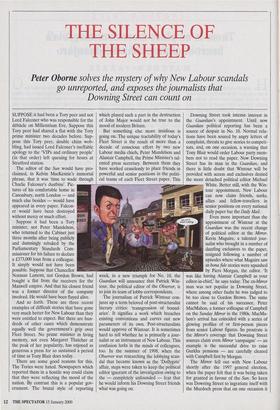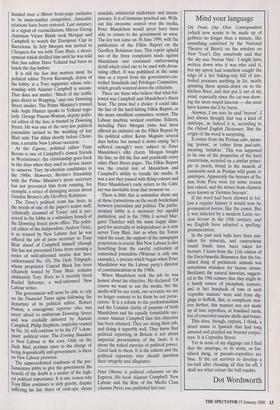THE SILENCE OF THE SHEEP
Peter °borne solves the mystery of why New Labour scandals
go unreported, and exposes the journalists that Downing Street can count on
SUPPOSE it had been a Tory peer and not Lord Falconer who was responsible for the debacle on Millennium Eve. Suppose this Tory peer had shared a flat with the Tory prime minister two decades before. Sup- pose this Tory peer, double chins wob- bling, had issued Lord Falconer's ineffable apology to the 'VIPs and ordinary people' (in that order) left queuing for hours at Stratford station.
The editor of the Sun would have pro- claimed, in Kelvin MacKenzie's immortal phrase, that it was 'time to wade through Charlie Falconer's dustbins'. Pic- tures of his comfortable home in Canonbury, north London — and much else besides — would have appeared in every paper. Falcon- er would have been destroyed without mercy or much effort.
Suppose it had been a Tory minister, not Peter Mandelson, who returned to the Cabinet just three months after being publicly and damningly rebuked by the Parliamentary Standards Com- missioner for his failure to declare a £373,000 loan from a colleague. It simply would not have been possible. Suppose that Chancellor Norman Lamont, not Gordon Brown, had bought a fiat from the receivers for the Maxwell empire. And that his closest friend was a former director of the company involved. He would have been flayed alive.
And so forth. These are three recent examples of difficult stories that have gone very much better for New Labour than they were entitled to expect. But there are hun- dreds of other cases which demonstrate equally well the government's grip over Fleet Street. No prime minister in living memory, not even Margaret Thatcher at the peak of her popularity, has enjoyed as generous a press for so sustained a period of time as Tony Blair does today.
There are some good reasons for this. The Tories were hated. Newspapers which reported them in a hostile way could claim that they were reflecting the mood of the nation. By contrast this is a popular gov- ernment. The brutal style of reporting which played such a part in the destruction of John Major would not be true to the mood of modern Britain.
But something else more insidious is going on. The unique tractability of today's Fleet Street is the result of more than a decade of conscious effort by two new Labour media chiefs, Peter Mandelson and Alastair Campbell, the Prime Minister's tal- ented press secretary. Between them they have worked ceaselessly to place friends in powerful and senior positions in the politi- cal teams of each Fleet Street paper. This week, in a new triumph for No. 10, the Guardian will announce that Patrick Win- tour, the political editor of the Observer, is to join its team of lobby correspondents.
The journalism of Patrick Wintour con- jures up a term beloved of post-structuralist literary critics: 'transgression of bound- aries'. It signifies a work which breaches existing conventions and carves out new parameters of its own. Post-structuralists would approve of Wintour. It is sometimes hard to tell whether he is primarily a jour- nalist or an instrument of New Labour. This confusion lurks in the minds of colleagues, too. In the summer of 1998, when the Observer was researching the lobbying scan- dal that became known as the Dollygate' affair, steps were taken to keep the political editor ignorant of the investigation owing to the — completely unfounded — fear that he would inform his Downing Street friends what was going on. Downing Street took intense interest in the Guardian's appointment. Until now Guardian political reporting has been a source of despair in No. 10. Normal rela- tions have been soured by angry letters of complaint, threats to give stories to competi- tors, and, on one occasion, a warning that Tony Blair would order Labour party mem- bers not to read the paper. Now Downing Street has its man in the Guardian, and there is little doubt that Wintour will be provided with access and exclusives denied the more detached political editor Michael White. Better still, with the Win- tour appointment, New Labour can now claim friends, narks, allies and fellow-travellers in senior positions on every national daily paper bar the Daily Mail.
Even more important than the appointment of Wintour at the Guardian was the recent change of political editor at the Mirror. Kevin Maguire, a talented jour- nalist who brought in a number of dazzling exclusives to the paper, resigned following a number of episodes where what Maguire saw- as bona fide stories were squashed by Piers Morgan, the editor. 'It was like having Alastair Campbell as your editor-in-chief,' he says today. The ex-Mirror man was not popular in Downing Street, where among other faults he was judged to be too close to Gordon Brown. The same cannot be said of his successor, Peter MacMahon, a former colleague of Campbell on the Sunday Mirror in the 1980s. MacMa- hon's arrival has coincided with a series of glowing profiles of or first-person pieces from senior Labour figures. So prostrate is the Mirror's coverage that Downing Street sources claim even Mirror 'campaigns' — an example is the successful drive to raise Gurkha pensions — are carefully cleared with Campbell first by Morgan.
The Mirror fell out with New Labour shortly after the 1997 general election, when the paper felt that it was being taken for granted in favour of the Sun. So keen was Downing Street to ingratiate itself with the Murdoch press that on one occasion it handed over a Mirror front-page exclusive to its mass-market competitor. Amicable relations have been restored. Last summer, in a signal of reconciliation, Mirror Group chairman Victor Blank took Morgan and Campbell to watch the European Cup in Barcelona. In July Morgan was invited to Chequers for tea with Tony Blair, a devel- opment which thrilled him until he was told that Sun editor Dave Yelland had been to lunch the day before. It is still the Sun that matters most. Its political editor Trevor Kavanagh, doyen of the lobby, is a Tory supporter whose rela- tionship with Alastair Campbell is uneasy. That does not matter. 'Much of the traffic goes direct to Wapping,' says one Downing Street insider. The Prime Minister's trusted aide Anjie Hunter speaks to Yelland regu- larly. George Pascoe-Watson, deputy politi- cal editor of the Sun, is trusted by Downing Street. He was one of the very few political journalists invited to the wedding of key Blair aide Tim Allan shortly before Christ- mas, a notable New Labour occasion. At the Express, political editor Tony Bevins is one of Campbell's closest friends at Westminster: the relationship goes back to the days when they used to devise stunts to unnerve Tory by-election candidates in the 1980s. However, Bevins's friendship with the Prime Minister's press secretary has not prevented him from running, for example, a series of damaging stories about Gordon Brown's ally Geoffrey Robinson. The Times's political team has been, in the words of one of the paper's senior staff, 'ethnically cleansed a Tories' and is per- ceived in the lobby as a subsidiary branch of the Downing Street press office. The politi- cal editor of the Independent, Andrew Grice, rs so trusted by New Labour that he was offered the job of press secretary to Tony Blair ahead of Campbell himself (though this has not prevented Grice from running a series of well-informed stories that have embarrassed No. 10). The Daily Telegraph, whose proprietor Conrad Black has been effusively wooed by Tony Blair, remains obdurately Tory. Even so it recently hired Rachel Sylvester, a well-informed New Labour writer.
The government will soon be able to rely on the Financial Times again following the departure of its political editor, Robert Peston, a courageous reporter who was never afraid to embarrass Downing Street and was cordially detested by Alastair Campbell. Philip Stephens, implicitly trusted by No. 10, will continue to be the FT's dom- inant political voice. The Evening Standard Is New Labour to the core. Only on the Daily Mail, perhaps open to the charge of being dogmatically anti-government, is there no New Labour presence. The unprecedented readiness of the par- liamentary lobby to give the government the benefit of the doubt is a matter of the high- est political importance. It is one reason why Tony Blair continues to defy gravity, despite suffering his fair share of cock-ups, sleaze scandals, ministerial misfortune and incom- petence. It is of immense practical use. With- out this awesome control over the media, Peter Mandelson would never have been able to return to the government so soon. The key test came on 30 June 1999, with the publication of the Filkin Report on the Geoffrey Robinson loan. This report upheld two of the three complaints made against Mandelson and contained embarrassing detail which cried out to be used with devas- tating effect. It was published at the same time as a report from the government-con- trolled Standards and Privileges Committee, which greatly watered down the criticisms.
There are those who believe that what fol- lowed was Campbell and Mandelson's finest hour. The press had a choice: it could take the line of the hard-hitting Filkin Report, or the more emollient committee version. The Labour machine worked overtime. Editors, including Piers Morgan (who had been offered an exclusive on the Filkin Report by his political editor Kevin Maguire several days before but turned it down saying 'he's suffered enough') were subject to Peter Mandelson's silky charm. Morgan bought the line; so did the Sun and practically every other Fleet Street paper. The Filkin Report was the crucial test of Mandelson and Campbell's ability to handle the media. It was a test they passed with flying colours and Peter Mandelson's early return to the Cabi- net was inevitable from that moment on.
There is little that is unfamiliar about any of these transactions on the seedy borderland between journalism and politics. The parlia- mentary lobby is a necessary but squalid institution, and in the 1980s it served Mar- garet Thatcher with the same happy disre- gard for neutrality or independence as it now serves Tony Blair. Just as when the Tories ruled the roost, the support of the newspaper proprietors is crucial. But New Labour is also benefiting from the careful cultivation of committed journalists (Wintour is only one example), a process which began when Peter Mandelson was the Labour party's director of communications in the 1980s.
When Mandelson took the job he was honest about his objective. He declared: 'Of course we want to use the media, but the media will be our tools, our servants; we are no longer content to let them be our perse- cutors.' It is a tribute to the professionalism and the Leninist clarity of purpose of both Mandelson and his equally formidable suc- cessor Alastair Campbell that this objective has been attained. They are doing their job, and doing it superbly well. They know that political reporting in Britain is not about impartial presentation of the facts; it is about the naked exercise of political power. Good luck to them. It is the editors and the political reporters who should question their integrity and allegiance.
Peter Obome is political columnist on the Express. His book Alastair Campbell: New Labour and the Rise of the Media Class (Aurum Press) was published last year.



























































 Previous page
Previous page